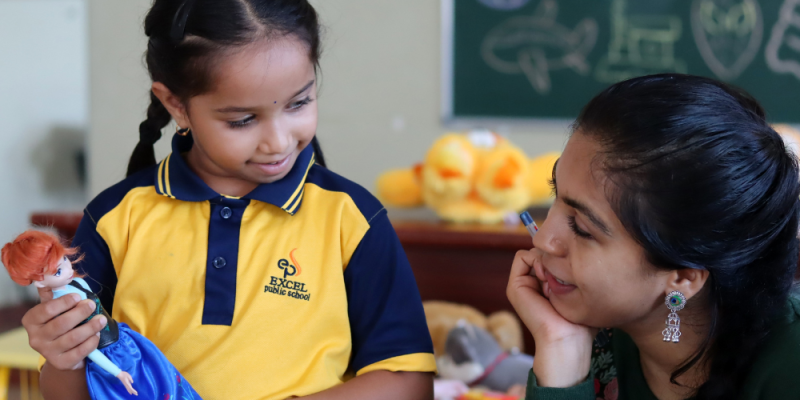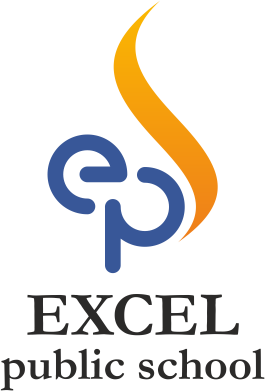Foundational Stage
- Foundational Stage


Introduction
Early childhood education forms the cornerstone of a child’s lifelong learning journey, and Excel Public School places immense importance on this foundational stage to nurture holistic cognitive, emotional, and social development. Guided by the National Curriculum Framework (NCF), the school focuses on fostering essential skills such as early literacy, numeracy, critical thinking, problem-solving, communication, and social-emotional competencies. These foundational skills not only promote academic success but also inspire creativity, adaptability, and resilience, equipping children to navigate a rapidly evolving world.
Our Foundational School offers a holistic, fun-filled, stress-free, and child-centered learning experience for our early learners (Pre-KG, Kindergarten, Grades 1 and 2). The significance of early childhood education cannot be overstated, as these years profoundly impact a child’s lifelong growth, development, and overall well-being. Therefore, Excel Foundational School strives to provide a balanced and comprehensive foundational curriculum that lays the groundwork for student’s academic success in higher grades, as well as their emotional well-being in all relationships.
Excel Foundational School’s early education programmes align with both the NCF and the National Education Policy (NEP), which recognize Early Childhood Care and Education (ECCE) as critical for building a solid foundation. The school embraces the NCF’s play-based, experiential learning approach, ensuring children develop not only intellectually but also through active engagement and exploration. By adhering to the NCF and NEP’s principles, Excel Public School is dedicated to providing equitable access to high-quality education, promoting inclusivity, and supporting the holistic growth of every child. This approach not only nurtures the individual potential of each student but also contributes to creating a knowledgeable, innovative, and responsible future generation.
• Creativity and Innovation
• Critical Thinking and Problem Solving
• Communication
• Collaboration
• Global Awareness
• Financial, Economic and Entrepreneurial
• Literacy
• Media Literacy
• Health and Civic Literacy
• Environmental Literacy
Critical brain development occurs during a child’s formative years, which typically lasts from birth to age eight. Excel Public School provides an early childhood education curriculum that provides educational stimuli that children need more than just a strong foundation in the core curriculum; children need to develop a compassionate understanding of the world around them to bring about holistic growth. Aligning ourselves to the guidelines of NEP 2020, a skill-based approach is followed to prepare children for the future.
We adopt a multi-sensory, activity-based approach where subjects are seamlessly integrated emphasizing real-life application, a child is the centre of our learning process. The lessons and activities are designed to help children exercise their multiple intelligences. Each child is provided with ample opportunities to participate in these activities to develop these intelligences.
Experiential learning is practised in its true sense where children ‘learn by doing’ and reflect on the experience which enriches their learning. Well-planned experiential learning programmes stimulate academic inquiry by promoting interdisciplinary learning. Oral language development and pre-writing skills are reinforced to lay a strong foundation for language and writing skills. Circle time is a happy time when children are free to interact and share their experiences. Circle time is well planned to develop a wide range of skills and attitudes such as confidence, self-esteem, speaking, and listening.
Children channelize their energy through music and movement. The gross motor – fine motor skills, body balance, coordination, and sense of rhythm develop along the musical journey. Art integration is a cross-curricular pedagogical approach adopted in our Foundational School that utilizes various aspects and forms of art as the basis for learning concepts across subjects creating a joyful environment.
With well-equipped classrooms, activity space with dedicated corners of Early Childhood Education (ECE) set up, ample outdoor play area, engaging storytelling sessions, Toy Based Learning, nature walk, and exploration beyond books, EPS provides a nurturing environment for young learners to not only attain Foundational Literacy and Numeracy (FLN) skills but to become lifelong thinkers and learners.
Curriculum
The Foundational Stage encompasses a crucial phase in a child’s learning journey. Special attention is paid to making sure that children enjoy every aspect of schooling in their formative years. This stage prioritizes flexible, multi-level, play-based, activity-based, and discovery-based learning, integrating the latest research in early childhood care and education.
Children typically build upon their existing learning experiences from home and/or previous schooling. At Excel Foundational School, we facilitate their learning through well-planned and stimulating play-based approaches that develop their interests, curiosity, and creativity.
- Physical Development
- Gross and Fine Motor Skills
- Sharpness in sensorial perceptions
- Fit and flexible body
- Sensory and Motor Development
- Socio-Emotional and Ethical Development
- Cognitive Development
- Curiosity and Exploration
- Language Development
- Aesthetical and Cultural Development
- Fine and Gross Motor Skills
- Reasoning and Problem-Solving Skills
- Language and Communication Skills
- Critical and Creative Thinking Skills
- Socio-Emotional Skills
- Interpersonal Skills
- Imagination Skills
Assessment and Evaluation
In a competency-based curriculum, as envisioned by the National Curriculum Framework, assessment serves as a comprehensive mechanism for gathering evidence of students’ learning achievements. There is NO formal assessment during the Foundational Stage. The assessment process involves consolidating their learning and applying newly acquired skills through a variety of meaningful activities and exercises, on an ongoing basis, along with collaborating and coordinating gathered information through diverse assessment modalities.
Assessment processes are meticulously designed to seamlessly integrate with the child’s learning experience. Recognizing the individuality of each child’s learning style and expression, assessment of Learning Outcomes or Competencies are achieved through implementing a diverse range of assessment modalities for the same Learning Outcome.
Each assessment is systematically documented to monitor individual growth over time, with regular feedback provided to support continuous improvement. As this process is continuous and embedded in everyday learning, there will be no pre-announced dates or specific intimations regarding the assessments. Each assessment is thoroughly documented to track the child’s progress and at the end of the Academic Year, this process culminates in a detailed Holistic Progress Report, offering insights into the child’s development across cognitive, socio-emotional, and physical domains.
Activities
| Subject | TERM-1 (100 marks) (First half of the session) 20 Marks Periodic Assessment (PA) + 80 Marks for Half Yearly Exam |
TERM-2 (100 marks) (Second half of the session) 20 Marks Periodic Assessment (PA) + 80 Marks for Year-end Exam |
||
|---|---|---|---|---|
| PA 20 Marks | Mid-Year Exam | PA 20 Marks | Yearly Exam | |
|
Language – 1 Language – 2 Language – 3 Mathematics Science Social Science |
• Periodic Test 10 marks with syllabus covered till announcement of test dates by school. • Note book submission for 5 marks at term-end. • Subject Enrichment for 5 marks at term-end |
• Written exam for 80 marks with syllabus covered till announcement of Half Yearly exam by school. |
• Periodic Test 10 marks with syllabus covered till announcement of test dates by school. • Note Book submission for 5 marks at term-end. • Subject Enrichment for 5 marks at term-end. |
• Written exam for 80 marks with syllabus coverage as below: • Class VI: 10% of 1st term covering significant topics + entire syllabus of 2nd term. • Class VII: 20% of 1st term covering significant topics + entire syllabus of 2nd term. • Class VIII: 30% of 1st term covering significant topics + entire syllabus of 2nd term. |
Subject
TERM-1 (100 marks) (First half of the session) 20 Marks Periodic Assessment (PA) + 80 Marks for Half Yearly Exam
TERM-2 (100 marks) (Second half of the session) 20 Marks Periodic Assessment (PA) + 80 Marks for Year-end Exam
PA 20 Marks
Half-Year Exam
PA 20 Marks
Yearly Exam
Language – 1
Language –2
Language –3
Mathematics
Science
Social Science
- Periodic Test
10 marks with syllabus covered till announcement of test dates by school. - Note book submission for 5 marks at term-end.
- Subject Enrichment:5 marks at term-end
- Written exam for 80 marks with syllabus covered till announcement of Half Yearly exam by school.
- Periodic Test for 10 marks with syllabus covered till announcement of test dates by school.
- Note Book submission for 5 marks at term- end.
- Subject Enrichment for 5 marks at term-end.
- Written exam for 80 marks with syllabus coverage as below:
- Class VI:
10% of 1st term covering significant topics + entire syllabus of 2nd term. - Class VII:
20% of 1st term covering significant topics + entire syllabus of 2nd term. - Class VIII:
30% of 1st term covering significant topics + entire syllabus of 2nd term.
| Subject | 80 Marks (Final Assessment) Student has to secure 33% marks out of 80 marks in each subject | 20 Marks (Internal Assessment) Student has to secure 33% marks out of overall 20 marks earmarked in each subject. | ||
|---|---|---|---|---|
| Periodic Assessment (10 Marks) | Portfolio (5 Marks) | Subject Enrichment Activity (5 Marks) | ||
| i | ii | iii | ||
| Language 1 | School/Board will conduct final assessment for 80 marks in each subject covering 100% syllabus. | Periodic Pen Paper Test – 5 Marks | (Classwork, peer & self-assessment, achievements of student in the subject, reflections, narrations, journals, etc.) | Speaking and Listening Skills |
| Language 2 | Objective type including Multiple Choice Questions-20% | (Written test restricted to three in each subject in an Academic Year). | Speaking and Listening Skills | |
| Science | Case-based/source-based Integrated questions-20% | (Average of the best two tests will be taken for final marks submission) | Practical Lab Work | |
| Mathematics | Short Answer/Long Answer Questions-60% | Math Lab Work | ||
| Social Science | Marks and Grades will both be awarded for Individual subjects. A 9-point grading will be followed | Multiple Assessment – 5 Marks (Quizzes, oral test, concept map, exit cards, visual expressions etc.) | Project work | |
| Skill Subject** Information Technology/ Artificial Intelligence |
|
|||
Classes 11 and 12
| Maximum marks per subject | 100 marks |
|---|---|
| Types of Assessment |
|
Academic Subjects
|
Marks Distribution – (Internal Assessment: Board Examination/Year End Examination) 20:80 30:70 |
| Components of Board examination paper |
|
Skill Subjects
|
|
- Overall Assessment and Session Ending Assessment of 50% weightage each.
- Overall Assessment includes Periodic Tests and Half Yearly examination.
- Year ending examination includes complete syllabus in theory and practical/project.
- The qualifying marks in each subject will be 33%.
- In a subject involving practical work a student must obtain 33% marks in theory and 33% marks in practical’s separately in addition to 33% marks in aggregate, in order to qualify in that subject.
- For class 12 the Board will conduct the external examinations at the end of Class 12. Pattern of Class 11 for Periodic Test and Half Yearly will be followed in Class 12 also.
- In Class 12, CBSE guidelines will be followed and there will be CBSE conducted Board Examination in February/ March.
Sociosqu tellus neque pharetra augue bibendum netus ad a pellentesque.
Sociosqu tellus neque pharetra augue bibendum netus ad a pellentesque.
Sociosqu tellus neque pharetra augue bibendum netus ad a pellentesque.
Foundation School: 9:00 am to 3:30 pm (Monday to Friday)
Preparatory to Senior Secondary: 9:00 am to 4:00 pm (Monday to Friday)
- Monday to Friday : 10:00 am to 4:30 pm
- Saturdays : 10:00 am to 1:00 pm
- Foundation School will have HOLIDAYS ON ALL SATURDAYS (except when they have some special programmes, for which advance intimation shall be sent).
- Parents desirous of meeting Class Teachers/Subject Teachers would do so ONLY on SECOND SATURDAYS between 10:00 am and 12:30 pm. Teachers WILL NOT be available to meet the parents on the Third and Fourth Saturdays, unless with prior permission.
- THE FIRST SATURDAY of every month will be a Holiday for both the campus.
The academic year spreads from the first week of June to the last week of March. The Annual Assessment Reports would be distributed on or before the 10th of April.
Students have holidays of two weeks during Dasara and one week during Christmas–New Year, apart from the two months of Summer Holidays (during April–May).
Every student is given a ‘Handbook’ that would contain all the activities and events during the academic year, including the holidays and special programmes
Prescribed Textbooks
Pellentesque felis eros fames id torquent molestie himenaeos.
Pellentesque felis eros fames id torquent molestie himenaeos.
Pellentesque felis eros fames id torquent molestie himenaeos.
Pellentesque felis eros fames id torquent molestie himenaeos.
Pellentesque felis eros fames id torquent molestie himenaeos.
Pellentesque felis eros fames id torquent molestie himenaeos.
- Foundational Stage
